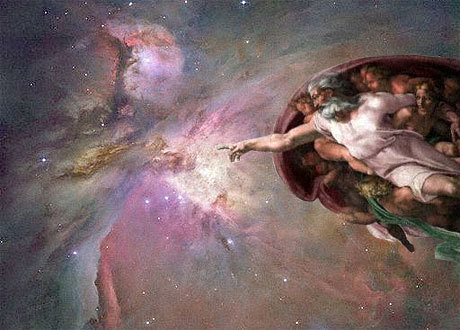 "Science takes things apart to see how they work. Religion puts things together to see what they mean."
"Science takes things apart to see how they work. Religion puts things together to see what they mean."I recently stumbled upon this quote in a book I was reading. The quote is originally by Rabbi Jonathan Sacks and was used by Anglican bishop N. T. Wright in his book "Surprised by Scripture." It was the kind of quote that struck me as deeply profound. (It also struck me as the kind of quote that's best not being over analyzed, but I'm going to share some of my thoughts anyway.)
I don't know how Rabbi Sacks originally meant the quote, but Bishop Wright used it in the context of debunking the so-called science vs. religion debate. In his argument, Wright sees scientific inquiry and religious inquiry as complementary and not competing ideas. He notes that our brains are known to have a logical/objective right side and a left side that processes art, emotions, and creativity. He places religious thought in the left hemisphere, but, he says, we've so overvalued logic and rationality in the past 300 years that we assume religion needs to function like science.
For those who may not feel comfortable with treating religion differently, consider this. Could you scientifically measure my love for my family? Could you objectively prove that Van Gogh's "Starry Night" is beautiful or Beethoven's Ninth Symphony is emotionally moving? Why would you even want to? They are experiences and understanding that operate differently than logical objectivity.
Religious knowledge isn't meant to be reduced to simple "facts" or mathematical proofs. (Even though a lot of religious education operates as if it can, but that's a topic for another time.) Instead, religious meaning often comes from paradoxes and juxtapositions of ideas and events that seem contradictory:
- We can point to a cross, an instrument of execution, and call it a source of life. (Paul noted in 1 Corinthians that is is "foolishness" and "a stumbling block" to those outside the faith.)
- We can read Luther's paradoxical words, "A Christian is a perfectly free lord of all, subject to none. A Christian is a perfectly dutiful servant of all, subject to all." and see it as making perfect sense.
- We can describe God as being both just and merciful and Jesus as fully human and fully divine and not feel it's ironic.
- We place promise next to suffering, proclaim hope at a funeral, and say that the Kingdom of God is both here and on its way.
Religion looks at answering questions that cannot be easily solved by scientific analysis (Why am I here? Where does beauty or suffering come from? What is love?) but are still absolutely central to our world and lives. Science and religion, understanding and meaning aren't opposites on a pole; they are complementary ways of seeking truth and should, in fact, reinforce each other. As a personal example, learning the complexities of the atom or my body make me feel an awe that is identical to my sense of worship (a religious experience) and studying the questions of meaning lead me to wonder how we can more efficiently feed and heal people (questions for science).
I would hope that in the near future that we can see that learning "how things work" and "what they mean" are more valuable and beautiful when they are integrated than when they are treated as opposites.
From the Gray,
Pastor Ari
P.S. Here's a link to a related blog post on faith and science by David Lose, who I count as one of my digital spiritual guides. There's a brief video by a Lutheran astronomer that captures my hope for integration well.
“It’s not the world that I am changing; I do this so the world will know that it cannot change me.” –Garth Brooks, "The Change"
No comments:
Post a Comment